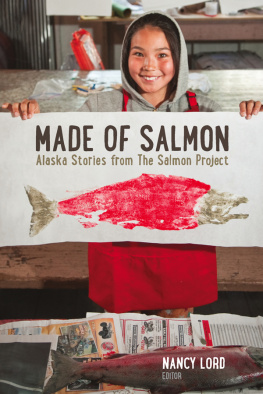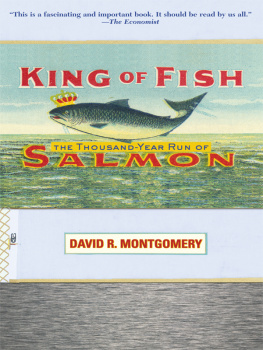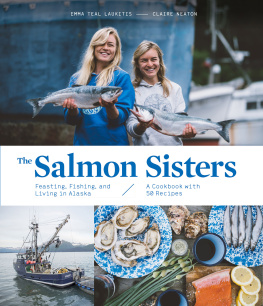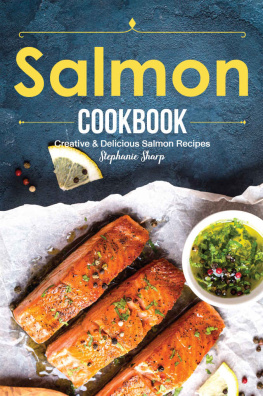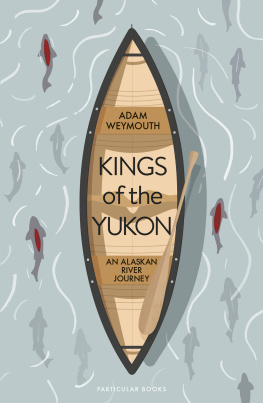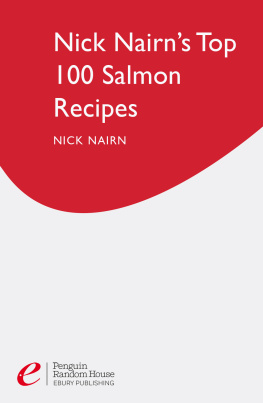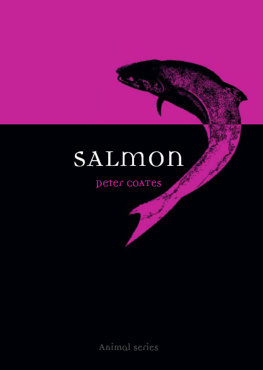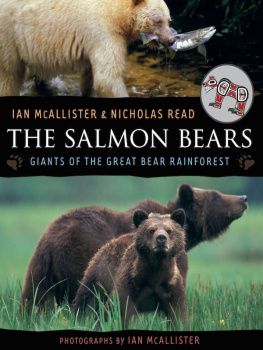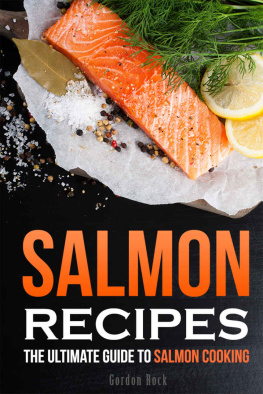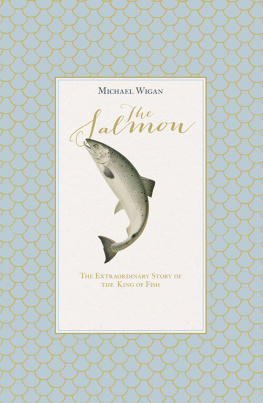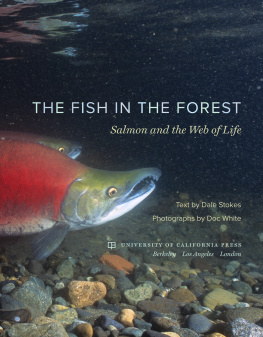Names: Lord, Nancy, editor.
Title: Made of salmon : Alaska stories from the salmon project / Nancy Lord, editor.
Identifiers: LCCN 2015022638| ISBN 9781602232839 (pbk. : alk. paper) | ISBN 9781602232846 (e-book)
Subjects: LCSH: Pacific salmon fisheries--Alaska. | Salmon industyAlaska. | SalmonAlaska.
Foreword
My earliest memories of salmon fishing are when I was a toddler, watching the subsistence nets to keep away the gulls. That was my job when we lived in Kanakanak, close to Dillingham. We had a good life. It was all about fishing.
Later, I was a commercial setnetter. My kids grew up fishing, and now my grandchildren are fishing. They put themselves through college. At the end of the commercial season, everybody goes upriver for subsistence fish. Everybody does the same thing, bears too. Its an incredible journey the fish make, and a wonderful system that, managed properly, will go on forever.
The years when I was Alaskas First Lady, going home to fish and visiting villages with Jay were my favorite activities. Everywhere, people were connected by salmon.
Today when my family comes to Lake Clark, we subsistence fish for our needs, and we smoke fish. My grandson built a new rack that is exactly the same as the rotted one his grandfather built years ago. I have a little radio I leave on all the time. Most of the conversation is about fish. Its fun to hear my neighbors talking about how many fish they caught and everything about fish. Its fun to watch the bears stroll by, looking for fish. I just cant imagine having a summer ever go by without fish.
When Jay was alive, politics was his territory. I left the heavy stuff to him. As governor, he used to talk about battles between the buck and the biota, and it was uppermost in his mind to stick with the science and protect the future. But in recent years, Ive had to take an interest in protecting our land and fisheries.
The people I converse with these days are more conservation minded than in the past. They want to take care of the environment. Politicians hardly use the word conservation, which bothers me. Younger people are more conscious of the future, more aware of things that can be improved and are improving.
The voices in this beautiful book tell us of the many ways that Alaskans are grateful for the salmon in their lives and concerned for the future. All over the state, were involved in different fisheries. We use different techniques, and we cut and prepare salmon differently. But we have salmon in common, and we know that we need to take care of what has served us so well.
Bella Hammond
Alaskas First Lady, 197482
Lake Clark
The Salmon Project
Salmon and Alaskans. We have danced with one another for millennia. For thousands of journeys around the sun, for more than three million spins of the earth, for hundreds of thousands of turns of the seasons, we have shared a rhythm. Each year, a great number of the hundreds of millions of salmon that mass and swirl in the currents of the North Pacific point their noses homeward and return to us. And we, in turn, move toward riverbanks, lakes, the ocean shoreline. We point our bows toward fishing grounds and travel to meet the fish on their return. As they surge toward us, we surge toward them. They help shape the rhythm of our lives.
The Salmon Project exists to tell the stories of the places and ways that Alaskans and their salmon come together. To help us learn about and see one anothers salmon connections across the great distances of our state. To create the moment where we recognize our salmon-ness, and where we discover the bonds we all sharewith the salmon and with each other.
Our salmon experiences are rooted in our home rivers, our family histories. In the landscapes where we have seen, harvested, heralded, mourned, celebrated, and welcomed home these beautiful creatures. We know the stream riffles and tiderips like the palms of our hands. Our young children can tell the difference between a chum and a coho. Our pantries are full of cans, our freezers of fillets and jerky. When we speak the word salmon, an image comes up in each of our mindsof the river, harbor, setnet site, bay, rod, creek, deck of the boatthe place that is home for salmon in our minds, in our personal experiences. Try it now. Close your eyes. Speak the word salmon. Where does it take you?
When we began The Salmon Project we hosted a series of a dozen focus groups in communities around the state. People came blind to the groups, not knowing that the conversation would be guided to salmon. They werent selected because they had salmon connections. They were pulled from the general population to meet basic demographic characteristics. Rooms full of strangers, often with very little in common, would warily enter into conversations about their values and what it means to live in Alaska. Eventually, salmon would come up, and the conversation would begin to follow that path. Invariably, the results were the samein these rooms full of attorneys, teachers, young fathers, municipal employees, homemakers, retired professors, all would lean in. They would begin to share their own salmon stories. And they would paint clear, bright lines tying their values as Alaskans to the presence of salmon in their lives. Values connected to their families: This is how my wife and I taught our children the importance of hard work. Values about freedom: Being able to be out here, harvesting this resource, providing for ourselves. Values about culture and tradition: My family and I have been coming to this beach every year for generations to harvest fish for the winter. And many more.
As we reviewed the results of this research, the thing that made the greatest impression on us was how quickly people could go from uncertainty about salmons connection to their own lives to absolute engagement and realization of its role. An image emerged. It was that of scratching the skin and revealing scales beneath.
We are salmon people. And what a blessing! How many other places in the developed world maintain seasonal rhythms tied to a living natural resource? Salmon nourish our lives and our spirits. In our research and engagements with Alaskans about salmon in their lives, one word comes up again and againlifeblood. People find salmon so vital to their lives that to be separated from it would cause irreparable harm.

